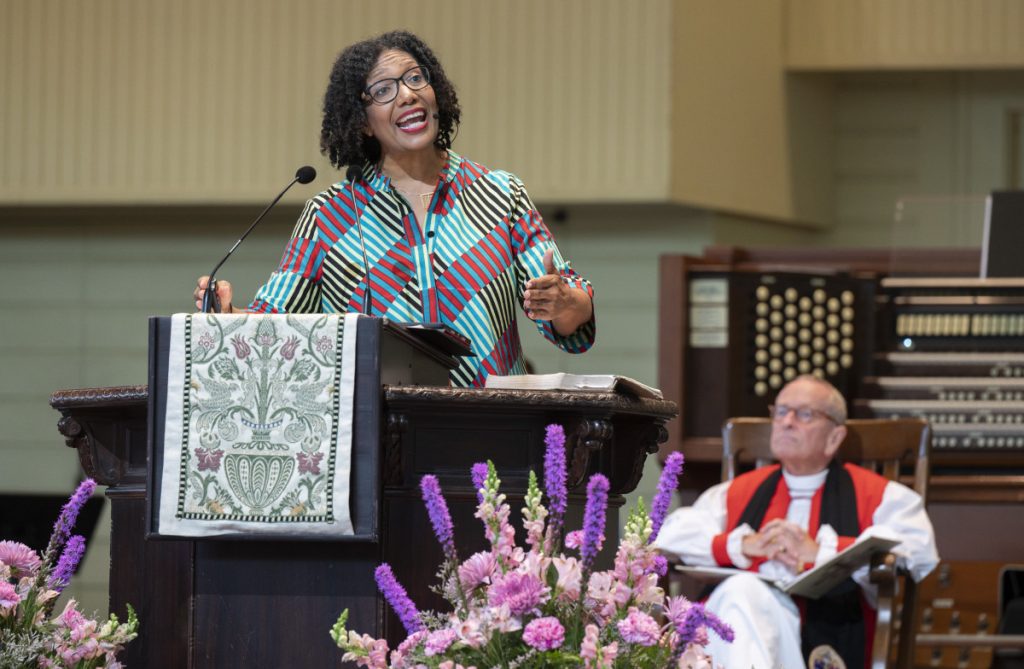MARY LEE TALBOT – STAFF WRITER

“What did it mean to be a daughter in Jesus’ day?” Lisa Sharon Harper asked at the 9 a.m. Aug. 7 worship service in the Amphitheater. “At the beginning of the day in Jesus’ time, a Pharisee would pray, ‘Thank you God, you did not make me a woman, a Gentile or a dog.’ ”
Harper’s sermon title was “Daughter.” The Scripture reading was Luke 8: 43-48.
Luke 8 contains the stories of two daughters. In Luke 8: 40-42, Jarius, a leader in the local synagogue, came to Jesus and asked him to heal his daughter, who was only 12 years old.
“She was a cherished daughter and was at death’s door. As Jesus moved through the crowd, a woman with a hemorrhage that had lasted 12 years came to Jesus. She had been bleeding as long as Jarius’ daughter was alive,” Harper said.
She continued, “The woman was ritually unclean. Because she continued to bleed, she could not take the ritual bath to be considered clean. She had no father to protect from the doctors, she had no husband or brother to defend her. But she had heard about Jesus and pushed through the crowd of mostly men, crawled at their feet and broke the law.”
In Jesus’ day, the woman had no right to be in the crowd, Harper said. She had no right to exercise agency; her story did not matter. It did not matter if she was healed; whether she lived or died did not matter. It did not matter that she was unclean, disabled or a woman.
“She did not matter, but she took her blood-crusted self, in a context that said, ‘Do not disturb the peace,’ and sought out help,” Harper said. “But Jesus stopped. He asked, ‘Who touched me?’ The disciples said, ‘Really? Everyone is touching you.’ Jesus said, ‘Who touched me? Because the power went out of me.’ ”
Harper continued, “And this bloody, crusty, isolated, unclean woman said, ‘It was me.’ Now Jarius is standing right there, waiting for Jesus, but Jesus listened to the story of her 12 years. God in the flesh looked at the woman made in God’s own image, who suffered at the hands of men like Jarius, who saw her as less than fully human. She lacked respectability and was oppressed in the male, white supremacist Roman occupation.”
Jesus told the woman, “Daughter, your faith has made you well.” Harper said, “He told her to go in shalom, in God’s kind of peace. He said, ‘I am your family, you are God’s daughter. Go in radical wellness, go with interaction.’ ”
Systems were not changed that day, but power moved from Jarius to the woman, from the center to the margins, from a privileged man to a blood-crusted woman. What caused the woman to seek help? Faith.
“She woke up and said, ‘I am equally called to agency, to servanthood. My brown skin, my disability, will not shut me out of community. The way I am human is the only way I need to be,’ ” Harper said. “She looked at the way things work and said, ‘This don’t work.’ Faith is what gave her the agency to move in nonviolent protest, and things changed.”
Harper asked the congregation, “What if all of the movements today — Poor People’s Campaign, Black Lives Matter — are actually movements of the spirit of the living God on earth, with agency to push against the systems that are crushing the world? What if they are moving power from the center to the margins? What if Jesus looks on their faith and calls them kin, daughter? What if?”
The Rev. J. Paul Womack presided. Joseph Musser, composer and longtime member of the Chautauqua and Motet Choirs and the Motet Consort, read the Scripture. The prelude was an improvisation by Joshua Stafford, who holds the Jared Jacobsen Chair for the Organist and is director of sacred music. Members of the Motet Choir sang “You Will I Love,” with music by Kevin Hildebrand, words by Johann Scheffler, translated by Catherine Winkworth. The postlude was “Fanfare,” by Percy Whitlock. The Alison and Craig Marthinsen Endowment for the Department of Religion provides funds for this week’s services and chaplain.




